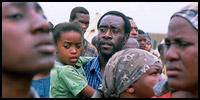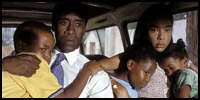
 |
|
Hotel Rwanda (2004) Cast: Don Cheadle, Sophie Okonedo, Nick Nolte, Cara Seymour, Joaquin Phoenix, Desmond Dube, Antonio David Lyons, Mothusi Magano 2004 – 121 minutes Rated: Reviewed by Dustin Putman, November 21, 2004.  "Hotel Rwanda," which invites comparisons to Steven Spielberg's harrowing 1993 Holocaust drama, "Schindler's List," tells of a tragic, senseless part of recent African history—the attempted 1994 genocide during the civil war in Rwanda—that most viewers will be only vaguely familiar with. The U.S. press covered it, but, like so many atrocious experiences in world history, it was more or less swept under the rug, passingly mentioned with barely a blip on most people's radar screens. As an American journalist (Joaquin Phoenix) explains at one point, "If people see this footage, they will go, 'Oh, God! That's horrible,' and then go back to eating their dinner." Such a statement is unfortunate, but also remarkably telling to the way we all, as human beings, live our lives.
"Hotel Rwanda," which invites comparisons to Steven Spielberg's harrowing 1993 Holocaust drama, "Schindler's List," tells of a tragic, senseless part of recent African history—the attempted 1994 genocide during the civil war in Rwanda—that most viewers will be only vaguely familiar with. The U.S. press covered it, but, like so many atrocious experiences in world history, it was more or less swept under the rug, passingly mentioned with barely a blip on most people's radar screens. As an American journalist (Joaquin Phoenix) explains at one point, "If people see this footage, they will go, 'Oh, God! That's horrible,' and then go back to eating their dinner." Such a statement is unfortunate, but also remarkably telling to the way we all, as human beings, live our lives.
 The political conflict that occurred in Rwanda began when Hutu rebels took over the country in the mid-1990s, their first goal to completely wipe out the Tutsi faction. The real-life figure at the center of the story is Paul Resesabagina (Don Cheadle), the Hutu hotel manager of the elegant, well-regarded Hotel Milles Collines in Kigali, who risked his own life in order to house over one-thousand Tutsi refugees during the upheaval. With the U.N. forces, led by Colonel Oliver (Nick Nolte), given orders not to aid directly in their fight, and his wife, Tatiana (Sophie Okonedo), in danger for being a Tutsi herself, Paul sees no other choice than to protect as many innocent people as he can. By the time the genocide ended in July 1994, over one-million Rwandans had been slaughtered.
The political conflict that occurred in Rwanda began when Hutu rebels took over the country in the mid-1990s, their first goal to completely wipe out the Tutsi faction. The real-life figure at the center of the story is Paul Resesabagina (Don Cheadle), the Hutu hotel manager of the elegant, well-regarded Hotel Milles Collines in Kigali, who risked his own life in order to house over one-thousand Tutsi refugees during the upheaval. With the U.N. forces, led by Colonel Oliver (Nick Nolte), given orders not to aid directly in their fight, and his wife, Tatiana (Sophie Okonedo), in danger for being a Tutsi herself, Paul sees no other choice than to protect as many innocent people as he can. By the time the genocide ended in July 1994, over one-million Rwandans had been slaughtered.
 "Hotel Rwanda" is an important motion picture in its unearthing of such a terrible moment within Africa's past, and there is a determined passion in the way director Terry George grittily chronicles it. Although the violence is not overtly graphic—the film is rated PG-13—George in no way turns away from this aspect or sugarcoats it in any way. When violence does occur, it is always realistic, disturbing, and jarringly sudden. As a dramatization of non-fiction events, a film that, more than anything, sets out to evoke distinct emotions within the viewer, "Hotel Rwanda" is certainly effective. Its steady grimness, however, is naturally offset with a heartening humanity and sense of hope that runs through the relationship between Paul and Tatiana.
"Hotel Rwanda" is an important motion picture in its unearthing of such a terrible moment within Africa's past, and there is a determined passion in the way director Terry George grittily chronicles it. Although the violence is not overtly graphic—the film is rated PG-13—George in no way turns away from this aspect or sugarcoats it in any way. When violence does occur, it is always realistic, disturbing, and jarringly sudden. As a dramatization of non-fiction events, a film that, more than anything, sets out to evoke distinct emotions within the viewer, "Hotel Rwanda" is certainly effective. Its steady grimness, however, is naturally offset with a heartening humanity and sense of hope that runs through the relationship between Paul and Tatiana.
 Where "Hotel Rwanda" is not as successful is in giving a clear voice to the Tutsis who turn to Paul and his hotel as refuge. As presented here, they are mournful, worried faces in a crowd, none of them given a chance to become three-dimensional individuals. Because writer-director Terry George and co-screenwriter Keir Pearson clearly intend to give these put-upon people an acknowledgment and sympathy that they were not offered in 1994, opting not to develop them, if even a handful, comes as a definite misstep. Without growing to care about them individually, the viewer can only see them, and put a stake in their fates, as a cumulative group. More often than not, screen time that might have been well-spent with them is neglected in favor of scenes with the white Westerners in the story, including the aforementioned U.N. leader and American journalist, as well as open-handed nurse Pat Archer (Cara Seymour).
Where "Hotel Rwanda" is not as successful is in giving a clear voice to the Tutsis who turn to Paul and his hotel as refuge. As presented here, they are mournful, worried faces in a crowd, none of them given a chance to become three-dimensional individuals. Because writer-director Terry George and co-screenwriter Keir Pearson clearly intend to give these put-upon people an acknowledgment and sympathy that they were not offered in 1994, opting not to develop them, if even a handful, comes as a definite misstep. Without growing to care about them individually, the viewer can only see them, and put a stake in their fates, as a cumulative group. More often than not, screen time that might have been well-spent with them is neglected in favor of scenes with the white Westerners in the story, including the aforementioned U.N. leader and American journalist, as well as open-handed nurse Pat Archer (Cara Seymour).
 Don Cheadle (2000's "Traffic") is the focal point of nearly every scene as self-sacrificing hotel manager Paul Resesabagina. Cheadle's performance is first-rate, bringing a courageousness to his exterior even as he becomes increasingly horrified for his family and learns the hard way how the rest of the world is turning a blind eye on their ordeal. As frightened, steadfast wife Tatiana, Sophie Okonedo (1997's "The Jackal") is just as solid, bringing high, raw emotions to her role without overdoing it with melodramatics. And as Pat Archer, Cara Seymour (2004's "Evergreen") is deeply touching with only limited on-screen time.
Don Cheadle (2000's "Traffic") is the focal point of nearly every scene as self-sacrificing hotel manager Paul Resesabagina. Cheadle's performance is first-rate, bringing a courageousness to his exterior even as he becomes increasingly horrified for his family and learns the hard way how the rest of the world is turning a blind eye on their ordeal. As frightened, steadfast wife Tatiana, Sophie Okonedo (1997's "The Jackal") is just as solid, bringing high, raw emotions to her role without overdoing it with melodramatics. And as Pat Archer, Cara Seymour (2004's "Evergreen") is deeply touching with only limited on-screen time.
 If "Hotel Rwanda" can achieve in reaching a broad audience and educating them on the unnecessary tragedy it portrays, then it will have done its job. As a tool for such, the picture is informative and well-made. Indelible images fill the frames, none more so than a scene in which Paul discovers he is driving over a pool of dead bodies on a fog-drenched road. As a tightly developed narrative, the film is more flawed, following a traditional storytelling path while slighting the development of the individuals most in need of being given names and identities. Nevertheless, judged as a whole, "Hotel Rwanda" is a frequently affecting, worthwhile effort.
If "Hotel Rwanda" can achieve in reaching a broad audience and educating them on the unnecessary tragedy it portrays, then it will have done its job. As a tool for such, the picture is informative and well-made. Indelible images fill the frames, none more so than a scene in which Paul discovers he is driving over a pool of dead bodies on a fog-drenched road. As a tightly developed narrative, the film is more flawed, following a traditional storytelling path while slighting the development of the individuals most in need of being given names and identities. Nevertheless, judged as a whole, "Hotel Rwanda" is a frequently affecting, worthwhile effort.
|
© 2004 by Dustin Putman |














